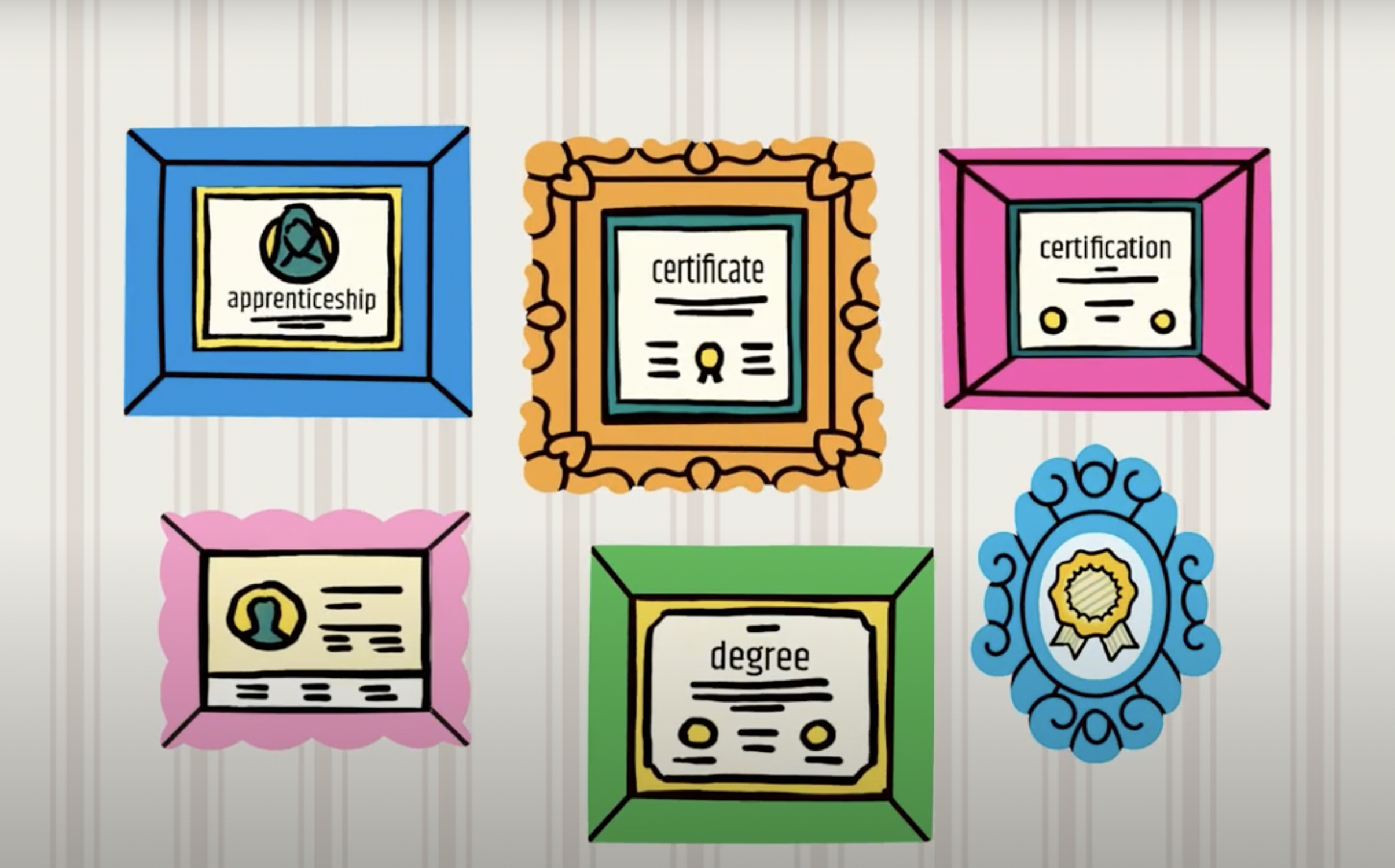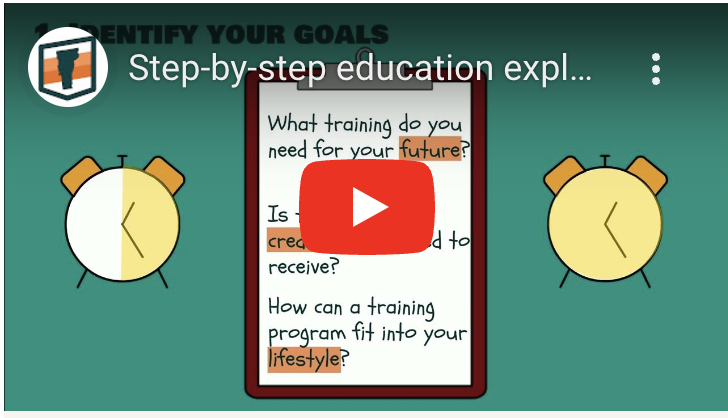Tips for balancing schoolwork and mental health
If you or somebody you know is experiencing an emergency, call 911, or 988 for a mental health crisis. Find your nearest crisis center here.
While taking the next step on your education or training journey can be an exciting time filled with new learning, it can also feel overwhelming. There are many factors that can make balancing competing demands, like school work and your own wellbeing, difficult. Whether it’s a full schedule and workload, life circumstances outside of your control, or a gloomy weather–induced slump, sometimes finding time for ourselves can become a big challenge.
Stephanie Cryer, a licensed clinical social worker and assistant director at the University of Vermont (UVM) Counseling and Psychiatry Services, says this is normal. Even better, she says there are actions you can take to find balance again.
“While having a 15-minute yoga or meditation practice or taking a 20-minute brisk walk each day does not change what is actually making a person stressed, it does allow a person to be able to address those stressors in a more thoughtful and calm manner,” Cryer said.
Techniques to regain balance can range from creating new routines, changing your surroundings, expressing yourself in creative ways, and more.
If you are having a difficult time figuring out how to get started, there are many practices and resources in Vermont that can help.
The basics
Food. Water. Sleep
Listen to your body and focus on the essentials.
Exercise and outdoor time
Living in Vermont can be a paradise with easy access to nature, tight-knit communities, and local goods. Even the toughest Vermonters, however, know that northern weather does not always cooperate. When the icy temperatures and rainy days hit, it can be difficult to stay on top of schoolwork, let alone your health needs.
“It can take being more creative to ensure that we are tending to our basic self-care during the cold and dark days,” Cryer said.
One way you can help yourself out of a funk is by moving your body, which can improve your mood and burn off stress. Connecting with nature is also linked with positive emotions.
“Allowing for time to engage in outdoor activities that bring joy is an important factor in keeping spirits up,” Cryer said.
While sports like skiing and snowboarding are popular in Vermont, there are many lower cost ways to enjoy the outdoors. Cryer suggests activities like sledding, snowshoeing, or taking a walk.
Spending time outside does not have to be complicated. Next time you’re talking on the phone, listening to a podcast or are lost in your thoughts, grab your walking shoes and take a stroll around your neighborhood.
While not a substitute for getting outside, there is even some research that watching a nature documentary can bring the same sense of calm that comes with the natural world.
Reflection
Cryer says that checking in with yourself is an important part of self care. She recommends focusing on your emotions, what is most meaningful to you, and the relationships you care about.
According to the Vermont State University (VTSU) Wellness Center, journaling is one of the best ways to achieve this self reflection.
If you aren’t a fan of writing, you can also record yourself speaking, try out your drawing skills, or find another creative way to express yourself.
Grounding exercises
The VTSU Wellness Center says focusing on mindfulness, which involves staying aware of your thoughts, feelings and surroundings without judgement, can help when life feels overwhelming.
One tool that you can use, for example, is a breathing exercise, which Cryer says can reduce anxiety. This is one way that you can address your stress without spending any money, as there are many free breathing exercise videos that you can access online.
There are many other ways to achieve grounding and mindfulness. Cryer recommends finding 2 or 3 exercises that work for you. This way, you will be equipped with the tools you need the next time things start to feel difficult.
Manage your time
Keeping up with your schoolwork not only is important for your studies, but can also reduce your overall stress. Practicing time management can help both your current and future mental health.
If you’re feeling overwhelmed, you can start with the small tasks, and go one by one. If you have a difficult time doing this without getting distracted, locate those distractions. For example, if your phone notifications take your focus away from the task at hand, try turning it off.
Establishing a routine can help with time management too. Developing study habits allows you to spend less time forcing yourself to do school work and more time on the actual work.
You can also try out different attention management strategies. For example, when working on a specific task, try the Pomodoro technique. This technique has you set a timer for 25 minutes of work and take increasing breaks between sessions. Or, if you are feeling swamped with work, you can use out the Einstein Matrix, which helps you sort tasks by urgency.

There are many other different tools that you can use to build your time management skills. Trying out a couple and finding the strategy that works for you can help you accomplish your work in a timely manner.
When all else fails, sometimes assistance from an outside source can make all the difference. Many schools have a tutoring center where you can get the specific support you need.
Stay connected
Focusing on your connections is a critical part of caring for your mental health. Not only does maintaining your relationships affect your life in the present, it also has positive effects long term.
From scheduling catch ups with long distance family members to complementing a stranger, there are many ways to create and sustain meaningful connections.
Equally as important, reaching out to others not only improves your mental health, but also impacts theirs.
“People often feel alone when they are experiencing mental health challenges, so a simple gesture to let a friend know they are not alone can go a long way,” Cryer said.
General Vermont Resources
Crisis Resources
- 988 Lifeline is available 24/7 to call, text, chat or video call for a free, confidential conversation.
- Find your local crisis center.
Free/Low Cost Group Exercise
- Green Mountain Club: The Green Mountain Club offers educational events, group activities and workshops for trail and hiking enthusiasts.
- Hiking Clubs: If you are looking for a group to spend time with outside, the Hiking Project has a list of over 10 hiking clubs across Vermont.
- Outdoors for Everyone VT: If you want to enjoy the outdoors, but aren’t interested in hardcore sports, Outdoors for Everyone VT has events for all skill levels.
- Sangha Studio: Sangha Studio offers yoga classes by donation, meaning you pay the rate you can afford for each class. They have four locations in Burlington, outdoor classes in the summer, and virtual classes for those who want to participate from the comfort of their own home.
- Unlikely Riders: Unlikely Riders is working to break down barriers for BIPOC Vermonters in mountain sports. They host community events, offer instruction and have winter gear closets in both northern and southern Vermont.
- Walk with a Doc: Take a walk with a doctor and learn about the health benefits of simply walking. This is a great option for people who prefer low impact exercise.
- National Alliance on Mental Illness (NAMI) Peer Support Group: If you would like to connect with and gain support from other Vermonters experiencing mental health conditions, you can find a peer support group at NAMI.
- Pathways Vermont Peer Support Line: Vermonters looking for someone to talk to can call the support line and have a confidential conversation with an understanding peer.
- Vermont 211: Vermonters can call 211 to get connected with the right resources for their situation. All calls are confidential.
School Resources
Many schools have health and wellness resources available to their students for free or at reduced rates. Whether you want to learn more about your options, find someone who understands the demands of your education, or simply have someone to talk to on campus, your school counseling center is a great place to start.
- Bennington College
- Student Health Center: The Student Health center offers both counseling and psychological services. Students can also receive 24/7 virtual mental health care with TimelyCare. You can access TimelyCare through the app or on their website.
- Champlain College
- Counseling Center: Students pursuing a degree at Champlain College can access mental health support at the school’s counseling center. The center offers many services, including individual counseling, group counseling, consultation, outreach and education, and medication management. Students can also always reach out to an on-call counselor at (802) 865-5745.
- Self Help Tools: Champlain College has compiled a list of tips and resources that students can use to learn about their mental health.
- Community College of Vermont (CCV)
- CampusWell: CCV students can read up on mental health, nutrition, relationships, and other subjects in the school’s online wellness magazine.
- Contact CCV’s resource coordinator with any specific questions at [email protected] or 802-318-3517.
- Landmark College
- Health, Counseling and Wellness: Students looking for counseling services and other types of mental health support can contact the Health, Counseling and Wellness staff.
- Middlebury College
- Center for Health and Wellness: At the Center for Health and Wellness, students can access many resources, including counseling services, tips for stress management and more.
- Norwich University
- Counseling and Wellness Center: The Counseling and Wellness Center can set students up with counselors, and also offers wellness programming such as therapy dogs visits, yoga and more.
- Saint Michael’s College
- Bergeron Wellness Center: Students can find mental, holistic and general health services at the Bergeron Wellness Center. The center also offers counseling services, from scheduled short term counseling to same day and drop in counseling. The counseling professionals can also give referrals for longer term off campus counseling.
- Be Well helps students nourish their holistic health through activities and education. Be Well’s page also offers helpful tips and other resources.
- Saint Michael’s College can also access peer support on TalkCampus, an app that allows students worldwide to connect over mental health.
- Sterling College
- Wellness Center: At the Wellness Center, students can access support from an on campus nurse and counselors. The center can also arrange and assist with off campus support.
- University of Vermont (UVM)
- Center for Health and Wellbeing: At the Center for Health and Wellbeing, students can access counseling and psychiatry services, wellness coaching, nutrition services, and more. UVM also offers after hours mental health care.
- Vermont State University (VTSU)
- Health and Wellness Team: Undergraduate students at each VTSU campus (online students too!) can access free counseling services.
- Health and Wellness Team: Undergraduate students at each VTSU campus (online students too!) can access free counseling services.


